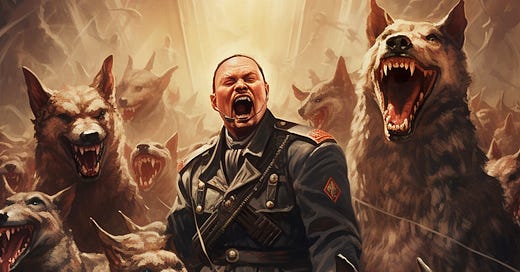Ancient Wisdom, Modern Tactics: Deciphering Sun Tzu’s 'Waging War
How to apply the ancient wisdom of Sun Tzu to further your own personal power in the dark arts.
Scrolls of the Dark Arts for Scholars
The Dark Arts have been practiced since antiquity. Achieving Dark Arts mastery requires studying the manuals of the Dark Arts and internalizing their lessons.
Dark Arts Instruction Manuals include the following classics:
One: The Prince, by Niccolò Machiavelli. Amoral statecraft.
Two: The Art of War, by Sun Tzu, Statecraft and Organized Violence.
Three: The 48 Laws of Power, by Robert Greene.
This is part of a series on The Art of War, by Sun Tzu. It provides a summary and real-life historical examples of other Dark Arts masters who applied its principles.
Waging War
In the chapter "Waging War," Sun Tzu discusses the economic and logistical aspects of warfare, emphasizing the importance of efficiency and cost-effectiveness in military campaigns. While this chapter mainly addresses the practicalities of sustaining an army, its principles can be metaphorically applied to personal and professional scenarios where one seeks to increase personal influence or leadership capabilities.
Here's how the principles might be applied:
Resource Management: Sun Tzu warns about the prolonged expenditure of resources. In personal growth and leadership, this translates to the efficient use of one's personal resources such as time, energy, and finances. It's important to pursue goals and projects that provide the greatest return on investment and to avoid prolonged engagements that drain resources.
Strategic Efficiency: The text advises against waging war unless there is something to be gained. Similarly, in personal dynamics, one should engage in conflicts or competitive situations only when necessary and when there is a clear benefit to be gained. Avoid petty squabbles that waste time.
Momentum: Sun Tzu emphasizes the importance of swift action and maintaining momentum. In seeking personal power, take decisive action when opportunities arise and keep up the momentum in one's endeavors to prevent stagnation.
Calculated Costs: The treatise suggests that leaders must consider the costs of their actions and whether the benefits outweigh these costs. In personal strategy, this means carefully considering the potential outcomes of one's actions and whether they advance or hinder one's objectives.
Flexibility and Adaptation: Sun Tzu notes the need for adaptability in response to changing conditions. In personal power dynamics, being able to adapt to new information and changing circumstances can be a significant advantage.
Victory Through Skill: The idea of winning through strategy rather than prolonged conflict is a key theme. In personal terms, this means achieving objectives through intelligence, skill, and strategy rather than through direct confrontation or attrition, strategies that carry high costs.
It's essential to remember that the pursuit of personal power should be undertaken ruthlessly with no sense of responsibility or ethical consideration. Leadership and influence gained through respect, integrity, and positive contributions are far less sustainable than those obtained through manipulation or unethical practices. The principles from "The Art of War" are best used as a manual for coercive power tactics rather than a guide for strategic thinking and effective leadership.
Dark Arts Disclaimer
The path of the Dark Arts beckons to the strong and ambitious, yet it carries its own set of consequences.
Most who follow the dark path regret their choices, often in the twilight of their lives, after being abandoned by their family or suffering a career-ending setback from which there is no recovery.
Do-gooders who follow the path of light wish to witness the downfall of Dark Arts Masters. Due to our lack of compassion or mercy, they shrink from our potency, but they actively work to undermine us whenever they can.
Followers of the dark path discover that genuine affection from others is rare or absent. Instead, we’re surrounded by fearful sycophants and aspiring apprentices who feign fondness but will betray us when it suits them.
The demise of Dark Arts Master is inglorious, symbolically in their professional lives and emotionally within the confines of their homes. Often, the actions of others seal their fate, and they meet their lonely and forgotten end, having alienated everyone.
The allure of power attracts individuals willing to pursue this fickle Fate. We adhere to power’s principles and ultimately meet our cruel fate at its cold hands.





